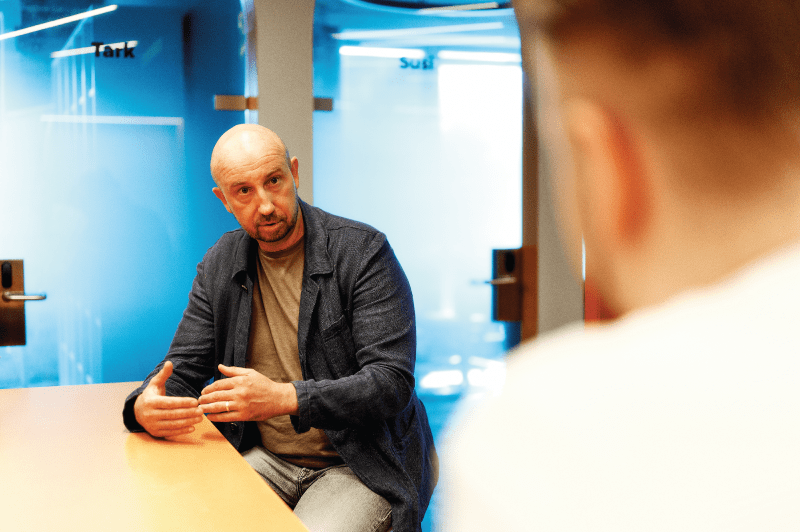“We love to work with people who build values-driven businesses with an eye towards having a positive effect on the world“
Richard J. Witismann
Over the past few years, Incorporate’s founder and CEO, Richard, has been very reflective and thoughtful regarding where he wishes to see Incorporate in the future.
Even before the launch of the famous Estonian e-Residency program, Incorporate has been providing corporate services to global entrepreneurs who have established a business in Estonia for one purpose or another. As the business environment is ever-changing, the need for entrepreneurs to adapt, see future trends, adjust their businesses, and keep learning is becoming increasingly important.
Richard holds 2 master’s degrees in law, one from the University of Tartu and one from the American University Washington College of Law. Before focusing on corporate services, which led him to establish Incorporate in the first place, he obtained a STEP Certificate in International Trust Management. During the reflection process, Richard also obtained a certificate in Sustainability Leadership and Corporate Responsibility from London Business School, which provided him with the necessary tools to carry out a pivot in Incorporate and to start focusing on sustainable and value-driven customers.
We interviewed Richard to better understand the pivot and how Incorporate will add value.
How would you sum up the trajectory of Incorporate until this point?
I would say that the initial idea behind Incorporate was to promote and offer Estonia as a good business jurisdiction, which it was and continues to be today. And our tagline “creating abundance through awareness”, which summed up almost all my past experiences in life, is still true today and continues to provide a vision for the future ever since its creation.
The most critical time that shaped me started in the 90s. In Estonia, it was a time when everything was resolved unlawfully. Once Estonia regained its independence and the totalitarian imperium of the Soviet Union collapsed, privatisation came along and suddenly everything became available. This in turn led to everyone wanting to grab everything and take things by force – Estonia was a “wild-wild west” in the 90s.
By 2000, things had become more civilized – it had become normal to resolve issues in court. I would say that 2000 was also the time when my conscious life began. I started to look more within and started to change my perspectives and views on life – I became more aware and conscious.
In 2009, Incorporate was established. By that time, I had reached a point in my life where I acknowledged that many things in the world could be done better. I had understood that money does not bring happiness and that the purpose of life cannot be money. While saying that, I also understand that this is an easy thing to say when you have food on your plate and a roof over your head. And unfortunately, there are many countries around the world where people do not have even these two basic things. One cannot think about sustainability or values if basic life necessities for survival are unmet.
Therefore we must have goals. We must be aware and must acknowledge what and why we are doing it. Having a moral compass is important and we must not do business with the mentality of “by any means necessary” and only having monetary goals.
Therefore, the pivot, which Incorporate went through, is more like a transformation towards its true nature, its true intention and making my view of the world public through Incorporate. Today, I have reached a point in my life where I want to help where the value to humanity is the biggest – sustainability and businesses that solve real problems and have a moral compass.
How would you briefly describe your worldview?
I believe in living a values-driven life, a conscious life, and a purposeful life. I think that people should make decisions based on their values instead of their beliefs because values tend to bring people together while beliefs tend to create division.
For me, becoming conscious is a process that involves developing self-awareness and distinguishing my own thoughts, beliefs, and values from the group I identify with. To achieve fulfillment and well-being, it’s important to embrace self-expression, connect with others in empathic relationships, and contribute to the well-being of others.
In general, my worldview emphasizes the significance of self-awareness, living according to my values, and making a positive impact on others.
How has the business environment around Incorporate changed until now?
Back when we started providing our services, the focus and awareness around the need for sustainability on a global scale was low. Once the Sustainable Development Goals by the United Nations were set in 2015 and corporate social responsibility became popular, everything started to change. In other words, when Incorporate started, SDGs were not defined, nor did the Estonian e-Residency program exist – things were quite different.
Once e-Residency came along in 2014, doing business in Estonia and globally was taken to the next level. After SDGs were defined, the awareness regarding sustainability started to spread to the more conscious public. This has directly led our regulators to implement necessary measures that have started the process towards us becoming sustainable and saving our planet.
There are numerous changes that have been implemented by now already. Businesses have more interim reports and things like ESG reports will soon be necessary even for small businesses. Recently the European Commission approved the new Green Deal plan and more substantial changes lie ahead as there is a consensus in many parts of the world that sustainability goals must be met.
I am sure that we cannot even imagine what the world will look like in 10 years. Sustainability is a bit like artificial intelligence. Everyone fears it and thinks that it is the future. But the case is that the future is now. AI and sustainability are happening and solving problems for us right now. Meanwhile, we cannot wait for the population to reach such levels of awareness that the transition would happen on its own, we must implement regulations and work with innovation to get results.
Also, the mentality that the success of a nation is measured only by GDP or GDP per capita is outdated. I think that being alive and doing business is not about money and we have better well-being indicators available that give a better understanding of our society.
Once the need to become sustainable became evident, people were talking about “the race to net zero”, which means that we must reach 0 output of greenhouse gasses. Today, however, net zero is not enough. We must start regenerating and rebuilding ecosystems to become sustainable.
In total, we are all on the same planet and face the same problem as a species. The whole planetary ecosystem must work in a balance, regardless of what heads of state or big corporation shareholders think – if the ecosystem fails, we all fail.

What does sustainability mean for you as an individual and as a business owner?
In my opinion, sustainability is used to characterize something that lasts and is preserved. The three aspects which should be sustainable are the economy, our society, and the environment. The United Nations Sustainable Development Goals have divided them into smaller steps that tackle all three aspects on various levels. All of them should be achieved and maintained by responsible behaviour to leave our planet for the next generations. Unfortunately, the planet we live on today is not sustainable in any of those aspects.
Here I remember a book called “Earth for All”, which has a lot of actionable proposals regarding the circular economy. It has become clear that the way that we operate today will only have one result – us falling off a cliff due to us crossing all our planetary boundaries.
While there are many aspects which need to become sustainable, the ones that everyone is vocal about today are energy and the environment. This is because these are the easiest and the most important ones that we need to tackle right now.
Wildlife has deteriorated. Earth’s lungs are being cut down around the world. Oceans are full of pollution. All of this has led to a massive drop in biodiversity – ecosystems have changed, temperatures have risen and natural disasters are starting to happen as a result.
On a bigger scale, thinking about the factors that influence our ability to be sustainable the most – those are the big corporations. Many big corporations are as powerful as the biggest countries in the world, and they are the ones that decide how things work on this planet. Unfortunately, many of them think that everything is fine and turn a blind eye towards sustainability. While big corporations have become aware of the need for sustainability, for them it is just a checkbox to be ticked and superficially becoming sustainable – essentially greenwashing and doing business as usual.
In addition, sustainability in our economy and society is not so talked about because for us to become sustainable in those aspects, we need to significantly rearrange our society, our rules, values and habits. This means a drastic shift. We need a shift from shareholder capitalism to stakeholder capitalism and about what I said before, there are many, who do not favour this shift for obvious reasons.
This leads to making the whole supply chain sustainable – paying decent salaries, using legal labour, etc. This is a topic that many people like to avoid. For example, our smartphones should cost about 15 000€ if everything in the supply chain would be done morally. In the developed world, child labour and unfair pay seem something distant as it happens somewhere on the other side of the world and most of us do not want to know about it if we can buy the things we need and want.
Another interesting topic is governance, involving the management of entities and everything around them. This is where things get deep and complicated as there are over 200 countries in the world and each of them has its interests, own politics and own problems. It is hard to harmonize and force legislation in this way and I cannot imagine how this will take place. In the EU, it is a bit easier as the EU can set standards, which individual countries follow and implement.
To sum it all up, I would say that everyone on the planet should have the bare minimum of what the SDGs define and these three aspects of our world – the economy, the environment and society – should be sustainable. I believe that every business must be managed sustainably with the society and the environment in which it operates.
How did the studies you conducted at London Business School complement your knowledge about sustainability?
Sustainability Leadership and Corporate Responsibility from London Business School is a specialized program designed to equip students with the knowledge, skills, and tools necessary to become effective leaders in the field of sustainable business practices. This program focuses on the integration of environmental, social, and governance (ESG) factors into business strategies, decision-making processes, and corporate cultures.
Students in this program explore topics such as sustainable business models, climate change and its impact on businesses, stakeholder engagement, responsible supply chain management, and the role of corporate governance in promoting sustainability. Graduates of this program are prepared to drive change, foster innovation, and promote responsible business practices across various industries, ensuring long-term success and resilience in an increasingly interconnected and resource-constrained world.
Actually, all of my previous experiences are what let me obtain this certificate from London Business School and studying there was more like a journey to get the right tools I needed.
During my studies, I was in a class of more than 30 people and most of them were from big corporations, like oil companies, where the transition to sustainability is needed the most.
At times, I found it hard to relate as a small business owner, as some of the exercises we had to do were not very applicable to Incorporate. However, this led me to understand the global scale of things, gave me a lot of things to consider and brought clarity that I should focus on aspects where I can make the most impact on the journey of making our planet sustainable.
How would you describe the value that Incorporate will provide from this point forward and how does Estonia as a business environment fit into the mix?
Estonia itself does not have a big negative impact on factors that we need to become sustainable across the globe if you compare it to big corporations and big countries from around the world. On the other hand, Estonia is a place where innovation takes place, a place where innovative ideas, which can potentially lead us towards sustainability, can grow.
With the pivot, we are launching 3 new accounting plans: VisionVault, GrowthGenius, and BalanceMaster. Each accounting plan offers unique benefits and support tailored to the specific needs of entrepreneurs at different stages of their business journey. Whether the clients are just starting, growing their businesses, or seeking balance in their entrepreneurial endeavors, the dedicated team and comprehensive services are here to guide and empower them towards achieving their goals.
In conclusion, I would say that Estonia is the perfect location for entrepreneurs to establish their businesses. We have plenty of opportunities here – we have ecosystems that help businesses and entrepreneurs grow and many looking to invest in solutions which will solve the problems of today and tomorrow. There is a reason why Estonia is the leading country in start-ups per capita in Europe!
Thank you for reading!



